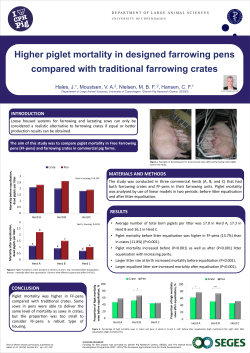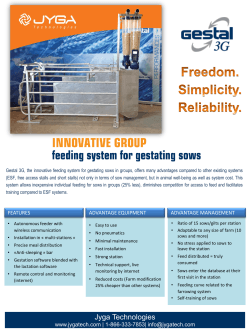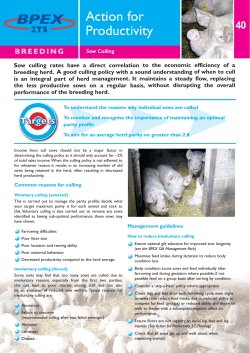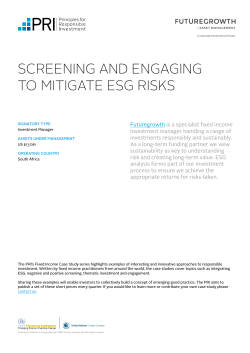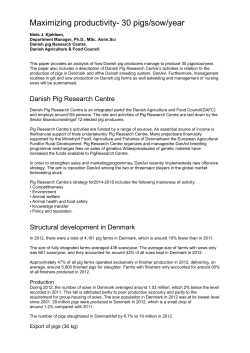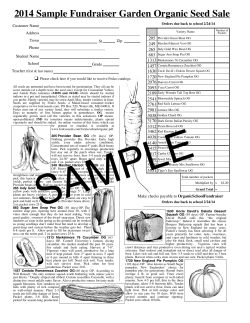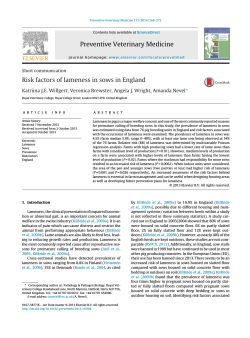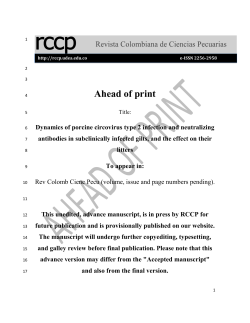
Confined and Loose Housed Sows Had Similar Duration of Farrowing
D E PA R T M E N T O F LA R G E A N I MA L S C I E N C E S UN IVE R S ITY O F C OPE NHAGE N Confined and loose housed sows had similar duration of farrowing Hales, 1 J. , Moustsen, V. 1Department 2 A. , Devreese, A. 1 M. , Nielsen, M. B. of Large Animal Sciences, University of Copenhagen; 2Danish 2 F. , Hansen, C. 1 F. Pig Research Centre, SEGES Email: hales@sund.ku.dk Table 1: Farrowing duration, birth interval and birth duration for crated and loose housed sows (mean (95 % CI)). CRATE LOOSE P-value n 62 58 INTRODUCTION Confinement of sows in farrowing crates limits the abilities of the sows to perform nest building behaviour. The stress-inducing aspects of this restriction can adversely affect the progress of parturition, resulting in prolonged farrowing and longer birth intervals. The aim of this study was to investigate if confinement before and during farrowing increased farrowing duration and birth intervals. Farrowing duration (min) First piglet to last born piglet First piglet to last live born piglet Birth interval (min) Birth duration (min) 462 (381; 552) 413 (345; 486) 23 (20; 26) 259 (228; 293) 394 (316; 483) 352 (287; 424) 26 (18; 24) 220 (190; 252) 0.26 0.22 0.25 0.09 Figure 1. Experimental treatments: left=LOOSE, right=CRATE. MATERIALS AND METHODS Multiparous hyper prolific Danish Landrace x Yorkshire sows from a commercial herd were randomly allocated to one of two treatments; CRATE (n=62) or LOOSE (n=58) before and during parturition (Figure 1). All farrowings were video recorded and piglet births were registered from observation of videos. Data was analysed using linear models. FARROWING PROGRESS Time (hh:mm:ss) RESULTS • Sows had a mean parity of 3.5±0.2 and gave birth to 17.9±0.5 piglets per litter. • Housing (CRATE and LOOSE) had no effect on farrowing duration, birth interval or birth duration (Table 1). • Older sows (parity 3+) had longer duration of farrowing than younger sows (parity 1-2) (P<0.001). • Birth interval was shorter for live born piglets (15 min (95% CI: 14; 17)) compared to stillborn piglets (30 min (95% CI: 24; 35)) (P<0.001). • Birth intervals of ranked piglets did not differ (Figure 2). Farrowing duration • Time from birth of first piglet to birth of last piglet • Time from birth of first piglet to birth of last live born piglet Birth interval • Time between expulsion of two succeeding piglets Birth duration • Time from birth of first piglet to birth of n’th piglet Part of these results previously published as: Hales et al. (2015) Livestock Science 171, pp 64-72 Piglet rank Figure 2. Ranked and clustered birth intervals (rank = position in birth order/total born piglets). Red = LOOSE sows, blue = CRATE sows. CONCLUSION Confining the sows in crates before farrowing did not affect farrowing progress ACKNOWLEDGEMENT Funding for this project was provided by Danish Pig Research Centre, SEGES, and The Danish Rural Development Programme 2007 -2013/The European Agricultural fund for Rural Development.
© Copyright 2025

